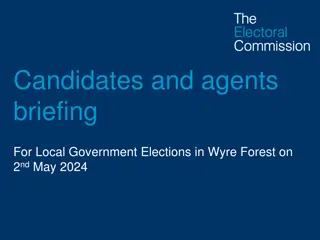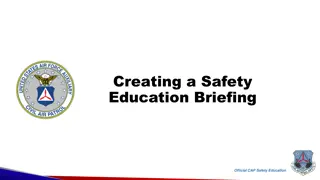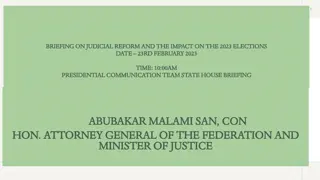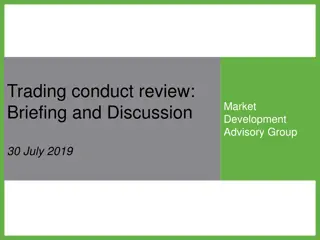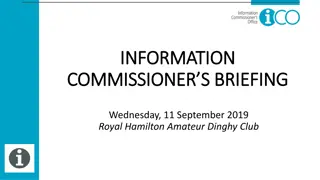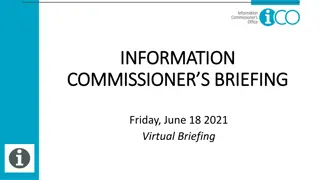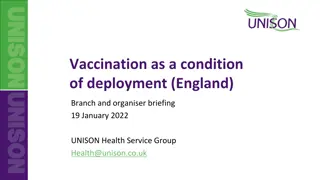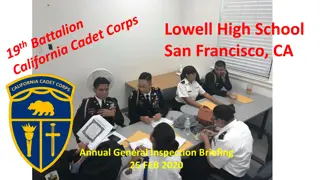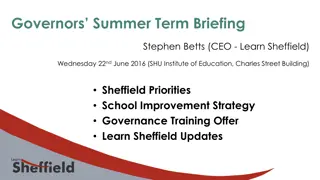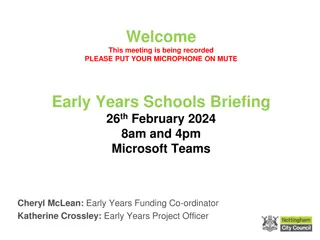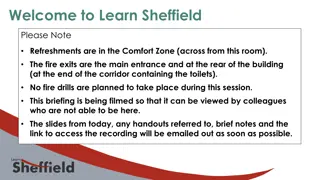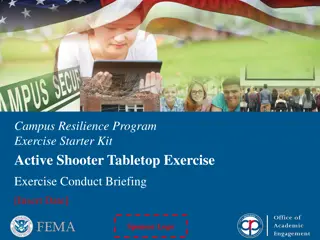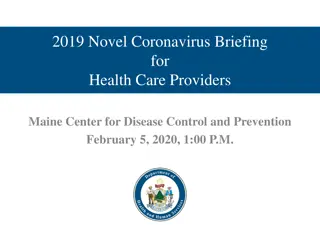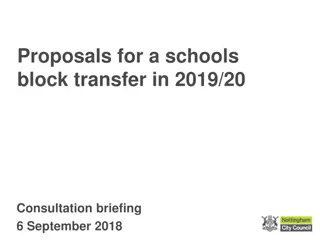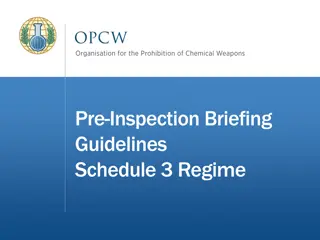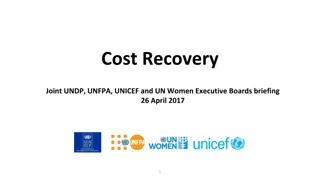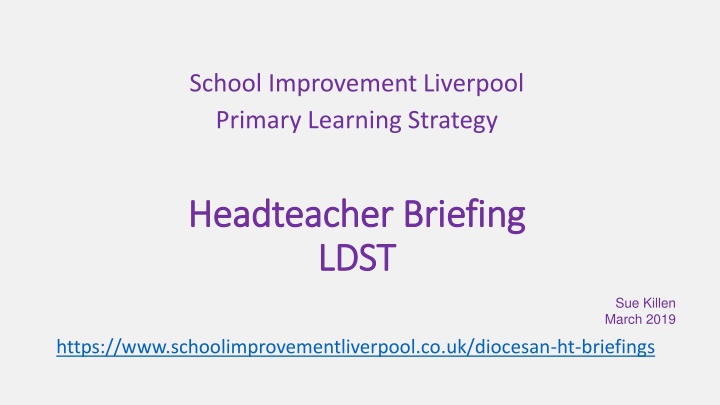
Liverpool Primary Learning Strategy and Assessment Updates
Stay informed about the latest primary learning strategies in Liverpool, including details on the upcoming Key Stage 2 multiplication tables check and information on pre-key stage standards. Explore resources, assessments, and important dates through this comprehensive briefing.
Download Presentation

Please find below an Image/Link to download the presentation.
The content on the website is provided AS IS for your information and personal use only. It may not be sold, licensed, or shared on other websites without obtaining consent from the author. If you encounter any issues during the download, it is possible that the publisher has removed the file from their server.
You are allowed to download the files provided on this website for personal or commercial use, subject to the condition that they are used lawfully. All files are the property of their respective owners.
The content on the website is provided AS IS for your information and personal use only. It may not be sold, licensed, or shared on other websites without obtaining consent from the author.
E N D
Presentation Transcript
School Improvement Liverpool Primary Learning Strategy Headteacher Headteacher Briefing LDST LDST Briefing Sue Killen March 2019 https://www.schoolimprovementliverpool.co.uk/diocesan-ht-briefings
Agenda Assessment Ofsted DfE Other information and dates
The 2018 'Key stage 2 multiplication tables check assessment framework' was published in November 2018 (document on link) Will be introduced in June 2020 The check will be delivered as an online, on-screen digital assessment Is to determine whether Y4 pupils can fluently recall multiplication tables Will only assess the instant recall of multiplication facts (division facts will not be part of the check) What will the multiplication tables check look like? ( taken from TES article, 14th November) https://assets.publishing.service.gov.uk/government/uploads/system/uploads/attachment_data/file/755745/2018_MTC assessment_framework_PDFA.pdf 25 questions worth one mark each, questions in no particular order Every question will follow the same format and will require the same type of response eg 4 x 8 = 32 Children will have a maximum of six seconds to answer each question this is based on research undertaken by the Standards and Testing Agency (STA), there will be a three-second pause before the next question is displayed Emphasis will be on the 6, 7, 8, 9 and 12 multiplication tables, with two to four questions in every test taken from each of the 6, 7, 8, 9 and 12 multiplication tables (meaning that between 18 and 22 questions will focus on KS2 content) No question reversals in any test, for example, 3 8 would not appear in the same test as 8 3 Children will be randomly assigned a test from a range of tests (all equal in difficulty, but with different questions in different orders), no test should have more than 30% of the same questions as another test Children will be able to access a practice area in the run up to the test window in June, this is so children can become familiar with the format of the test
Pre-key stage standards Pre-key stage standards information video: Understanding the new pre-key stage standards https://youtu.be/A8k5O1s18CY Presented by Diane Rochford OBE and lasting just under 5 minutes, it answers the following questions: What are the pre-key stage standards? How are these standards different to the interim versions? How should the pre-key stage standards be used? What about P Scales? PIVATS Milestones and the Pre-key stage standards Following the Government's review of statutory assessment arrangements for pupils in primary schools working below the standards of national curriculum assessments, PIVATS continues to be a viable assessment tool and have produced guidance to illustrate this: http://www3.lancashire.gov.uk/corporate/web/?PIVATS/14585
HMCI Annual Report December 2018 (Full document on link) Summarised by Amanda Spielman in a speech on 4th December 2018 (full transcript on link) A good and improving system
Themes: Getting the basics right, capacity to improve, schools and communities, returning to the substance of education Getting the basics right Early reading Reading is the gateway to all other subjects Link between poor literacy, levels of exclusion, unemployability, criminality Over a quarter of children leave reception without expected levels of CLL Learning to read is the single most important purpose in the first year of school, especially for disadvantaged children Intention is to strengthen focus on reading during inspection The results from some recent inspections have uncovered schools that are not teaching phonics and reading successfully, where many pupils read below age-related expectations, and where pupils do not become confident, fluent readers before they leave primary school. This is a concern. We will continue to evaluate the results from inspections over the next few months and, if they continue to show a similar picture, we will place a strong focus on the teaching of reading to the lowest 20% pupilsin the 2019 framework (HMCI Annual Report, page 10) Inspectors will focus on the extent to which pupils learn to decode text early through phonics and then develop intofluent, confident readers (Update for Inspectors, January 2019) The Phonics Screening Check has had strong impact
Capacity to improve School leadership and workforce Last year, focused on a group of intractable schools (those not got good in last 10 years or have two or more consecutive RI judgements) Bigger group of 490 schools (primary and secondary) looked at this year who have not received a good judgement since 2005 Not seeing the matching of failing schools to MATs quickly enough Some schools judged inadequate left in limbo for 18 months before they become an academy in a MAT More school leaders needed to support struggling schools DfE needs to do more to grow system leadership capacity, it has funding available and needs to set out how it will fund school improvement services Recruiting and retaining teachers (often in areas of greatest educational challenge) Communities and parents Education and care services should be a central part of the communities they serve
Regulation and inspection powers Unregistered schools Lack of regulation of independent schools Outstanding school exemption Since 2011, outstanding schools have been exempt from routine inspection (some not inspected for over a decade) Unpopular with parents and teachers (85% say exemption should not be indefinite) Blind spots in terms of quality of education and safeguarding Data triggers mean that some outstanding schools are inspected 149 exempt outstanding primary and secondary schools were inspected this year. 67% of the 149 declined from outstanding. Of those schools that had their inspection converted to a full inspection, only 7 kept their outstanding grade, 55 declined to good, 35 declined to requires improvement and 10 declined to inadequate Some of the reasons for schools declining were concerning: Safeguarding Temporary exclusions too high Teachers expectations too low (particularly for disadvantaged) Poor provision for SEND Ineffective governance Lack of CPD and leadership guidance for teachers
The outstanding grade should be a symbol that a school is a beacon of excellence. If we are to maintain its reputation, the exemption from inspection for outstanding schools must be removed and Ofsted fully resourced to inspect those schools (page 23) Ofsted is concerned about outstanding school exemption and has communicated this to DfE In response, a letter to Amanda Spielman from Nick Gibb (3rd December) asks that Ofsted reviews its current risk assessment arrangements and increases the inspection of exempt outstanding schools to 10% (which is the agreed sample) in acknowledgement that too few outstanding schools are inspected. The letter also points out that Ofsted can choose to visit schools where best practice is likely to be found
New approaches to inspection of MATs Inspections have not kept pace with the inspection of MATs MATs make decisions about financial management of schools, what is taught, how it is taught and how it is assessed As Ofsted is unable to inspect MATs directly, parents and government are missing out on important information Ofsted wants to hear from DfE about plans greater MAT accountability In the meantime there will be targeted piloting and inspector training leading up to December 2019 when MATs will be reviewed using MAT Summary Evaluations Building on our practice over the past four years, we will continue to inspect groups of schools in a MAT that are due to be inspected, but rather than doing so in a single week, these will be carried out across one or two terms. (page 25)
Ofsted and the year ahead (schools) research programme will look at: Practice that reduces workload and improves teacher well-being Practice that is being used to manage the most challenging behaviours and their consequences Practice of schools with a declared faith that successfully navigate potential conflicts between equality legislation and how they teach their beliefs and express them in their ethos and practices (in partnership with the faith inspectorates of religious education) Curriculum knowledge and pedagogy in initial teacher education SEND in mainstream schools What schools stuck at RI or inadequate can do to improve Ofsted is also: Consulting on the new education inspection framework For the first time, consulting on handbooks for each individual remit (schools, further education and skills, early years and independent schools), giving more opportunity to shape inspection In March, Ofsted will publish its latest research into: - observations - work scrutiny
Updates for Inspectors November 2018 January 2019 (full documents link)
November 2018 Segregation by sex Unlawful for schools to segregate pupils on the basis of any protected characteristic, unless permitted by the Equalities Act 2010 It is permitted for schools to segregate for the purposes of competitive sport, games or other competitive activities in which physical strength, stamina or physique are factors, a school is allowed to organise separate events for boys and girls From September 2018, any school segregating pupils unlawfully should have this addressed in their inspection report A school can not be judged good or outstanding for leadership if it is segregating pupils unlawfully Launch of EEG for school inspections from November 2018 Piloted over summer 2018 Largely positive feedback From November 2018, EEG to be used in an increasing number of inspections and in all by the end of summer term 2019 Inspectors will need to request schools to allow access to their internet connections
Safeguarding reminder Inspectors reminded that they should be familiar with: Keeping children safe in education: Statutory guidance for schools and colleges (www.gov.uk/government/publications/keeping-children-safe-in-education--2) Working together to safeguard children www.gov.uk/government/publications/working-together-to-safeguard-children--2 Inspectors should be very clear as to the standards that schools are required to maintain and should not expect to see schools taking action beyond these standards(eg, routinely checking the DBS status of existing staff) Inspectors should make sure that all relevant evidence is reviewed (including pupil, staff and parent questionnaires)
January 2019 The rationale for the Education Inspection Framework 2019 Vocabulary Correlation between vocabulary size and life chances Majority of vocabulary encountered when reading rather than through everyday speech Choose texts that have a varied and complex vocabulary and introduce them to children within the classroom (won t necessarily be the books that they initially choose to read for pleasure) Making Words Work This whole school resource for Y1 6 is guidance to support a progressive vocabulary throughout the foundation subjects It identifies more complex words used across the curriculum, often with a subject-specific meaning It is electronic enabling schools to organise the content to match their curriculum Skills Essential for pupils to develop skills so that when they learn the curriculum they are able to analyse, evaluate and solve problems using what they have learned No opposition between knowledge and skills, they are closely interconnected, Ofsted considers a skill to be the capacity to perform drawing on what is known
The Foundations: reading and mathematics Reading - Inspectors will focus on: The extent to which leaderscreate experts in the teaching of reading How well staffknow their school s chosen phonics programme How assessment is used to ensure children are provided with the small, repeated steps needed to be successful Whether the books children read from in school and at home closely match the phonics knowledge they have been taught How much time school provides each day teaching children to read Whether teachers read aloud to their children to: - show the joy that reading stories or non-fiction texts can bring - develop children s comprehension - widen their knowledge, vocabulary and ideas Maths - Inspectors will focus on: Early stages of learning, particularly about properties of number Whether schools have considered the sequence in which concepts are taught If enough time is given for children to recall what they have learned with fluency (eg automatically recalling number bonds, times tables) Children can draw upon previous understanding of facts, concepts and procedures and use them to develop new learning
The Education Inspection Framework (EIF) 1. Consultation on the proposed changes to the framework link to consultation: https://www.gov.uk/government/consultations/education-inspection- framework-2019-inspecting-the-substance-of-education/education-inspection-framework-2019- inspecting-the-substance-of-education 2. The draft framework https://assets.publishing.service.gov.uk/government/uploads/system/uploads/attachment_data/fil e/770924/Proposed_education_inspection_framework_draft_for_consultation_140119.pdf.pdf 3. The draft school inspection handbook https://assets.publishing.service.gov.uk/government/uploads/system/uploads/attachment_data/fil e/772065/Schools_draft_handbook_180119.pdf 4. The report about Phase 3 of the quality of curriculum in schools (along with phases 1 and 2, this underpins the draft framework) https://assets.publishing.service.gov.uk/government/uploads/system/uploads/attachment_data/fil e/766252/How_to_assess_intent_and_implementation_of_curriculum_191218.pdf (All on link)
Draft School Inspection Handbook (page 43) 165. Inspectors will bear in mind that developing and embedding an effective curriculum takes time, and that leaders may only be partway through the process of adopting or redeveloping a curriculum. Where leaders have an accurate evaluative understanding of current curriculum practice in their school and have identified appropriate next steps to improve curriculum quality and develop curriculum expertise across the school, inspectors will evaluate intent favourably when reaching the holistic quality of education judgement. They will recognise that the criteria for a judgement of good are best fit Ofsted support for schools Ofsted have carried out a lot of research, conducted surveys, trained inspectors and talked to leadership teams and there is a wealth of information available One recent example, focusing on informing on curriculum and the draft framework is a suite of curriculum videos and workshop materials for schools, available at: https://www.youtube.com/playlist?list=PLLq-zBnUkspPXjODb3PJ4gCqNc2LvfhSh Primary Learning Team support for schools
Consultation on the proposed changes to the framework Opens 16th January 2019 Closes 4th April 2019 Focus is on inspection that looks at the substance of education, what is taught and how it is taught Outcomesconsidered in the contextof what is being taught Quality of Education judgement brings together: curriculum, teaching, assessment and is intended to restore curriculum to its proper place Careful consideration has gone into the criteria used to judge curriculum Reminder that there is no Ofsted Curriculum Pilot programme of more than 200 inspections in spring term to put the draft framework criteria through their paces , along with responses from consultation, the findings from these will inform the final framework
Focuses within the draft framework: Curriculum is far more central to inspection, data holds a lesser place, the workload of teachers, access to a broad curriculum for all learners Curriculum The framework for setting out the aims of a programme of education, including the knowledge and skills to be gained at each stage (intent) The translation of that framework into a structure and narrative, within an institutional context (implementation) The evaluation of what knowledge and skills learners have gained against expectations (impact) Workload Improvements have already been made but on accountability system that is over-dependent on performance data is a barrier to further improvement Typical inspection conversations have come to be about: recent outcomes, current learners progress , expectations of future progress Framework will no longer include the standalone outcomes judgement Inspectors will continue to consider the outcomes that learners achieve, using valid, nationally collected data but they will focus on what is taught and how Internal assessment should be carried out in ways that don t create unnecessary burdens for staff Used creatively, assessment helps learners to embed and allows identification of next steps but leaders should understand the limitations of assessment and avoid misuse or overuse
Draft School Inspection Handbook (pages 44 45) 172. The collection of data can also create an additional workload for leaders and staff. Inspectors will look at whether schools collections of attainment or progress data are proportionate and represent an efficient use of school resources, and are sustainable for staff. The report of the Teacher Workload Advisory Group, Making data work recommends that school leaders should not have more than two or three data collection points a year, and that these should be used to inform clear actions. 173. Schools choosing to use more than two or three data collection points a year should have clear reasoning for what interpretations and actions are informed by the frequency of collection, and the time that is taken to set assessments, collate, analyse and interpret the data created from this, and then act on the findings. If a school s system for data collection is disproportionate, inefficient or unsustainable for staff, inspectors will reflect this in their reporting on the school Access for all learners Inspectors need to be sure that schools do not remove, or lose, pupils from their roll for reasons other than those in the best educational interest of the child Also outlined: Judgement about Learners personal development separate from judgement about Learners behaviour and attitudes Personal Development (intent) Behaviour and Attitudes (impact) This is about what you are doing to build a strong learning environment About having high expectations, consistently and effectively applied Includes exclusions and attendance Is this the kind of school in which children can learn? This is about what you have put in place to offer the rich and wide development of children that goes beyond the academic (spiritual, moral, cultural, character, resilience etc) The quality of provision offeredto improve children s life chances
11 Framework Proposals 1. Quality of Education judgement will focus on intent, implementation and impact in the context of a school s own curriculum, taking into account teaching, assessment, attainment and progress to arrive at a single judgement Judgement on personal development is separate to behaviour and attitudes To ensure that the judgements in the framework for EYFS are appropriate for the range of EY settings 2. 3. Maintained schools and academies 4. Section 8 inspections to increase from 1 to 2 days The purpose of a section 8 inspection of a good school (to confirm it is still good), will not change What it means to be a good school is different What is inspected will be drawn principally from the quality of education judgement, but also includes pupils behaviour, personal development and safeguarding The specific aspects of provision that will be inspected can be found in the draft inspection handbook (paragraphs 270 282) To gather sufficient evidence during inspection, inspectors will be on site for 2 days
5. Inspectors on site on the same day as the phone call There will be a change to the approach that inspectors take to prepare for inspection This will be on-site preparation for all section 5 and section 8 inspections Currently, inspectors prepare remotely on the day prior to on-site inspection, from September, this preparation will take place in school on the afternoon before the inspection This is to: - enable better communication between inspectors and school - reduce the burden on schools to make logistical arrangements on the morning of inspection - allow more time to establish good, professional relationships between leaders and inspectors, enabling senior leaders to enter into discussion with the lead inspector Timings: Formal notification no later than 10am on the day before inspection Lead inspector arrives in school no earlier than 12.30pm on that day Inspectors will leave no later than 5pm that day (paragraphs 51 56 of the draft handbook outline what on-site preparation should cover)
6. Inspectors will not use schools internal performance data for current pupils as evidence during inspection This is because: - internal data has limitations and may not represent pupils learning of the curriculum - inspectors will gather direct evidence of the quality of education in schools - inspectors will have meaningful discussions with leaders about how they know the curriculum is having impact Inspectors will ask for an explanation of: What assessment data schools have decided to collect and why What they are drawing from this information How this informs curriculum and teaching Burdensome use of assessment (Update for Inspectors, January 2019, page 14) Proposals 7 11 relate to non-association independent schools and further education and skills
The Draft Framework What has stayed the same? Four grades (outstanding to inadequate) Judgement on overall effectiveness What has changed? Key judgements - Quality of education (will have the most impact on overall effectiveness) - Behaviour and attitudes - Personal development - Leadership and management (has changed the least between old and new) What inspectors will consider when making judgements Quality of education (Intent, Implementation, Impact)
Intent (page 10) leaders adopt or construct a curriculum that is ambitious and designed to give all learners, particularly the most disadvantaged, the knowledge and cultural capital they need to succeed in life the provider s curriculum is coherently planned and sequenced towards cumulatively sufficient knowledge and skills for future learning and employment the provider has the same academic, technical or vocational ambitions for almost all learners. Where this is not practical for example, for some learners with high levels of special educational needs and/or disabilities their curriculum is designed to be ambitious and to meet their needs learners study the full curriculum. Providers ensure this by teaching a full range of subjects for as long as possible, specialising only when necessary
Implementation (pages 10 and 11) teachers have good knowledge of the subject(s) and courses they teach. Leaders provide effective support for those teaching outside their main areas of expertise teachers present subject matter clearly, promoting appropriate discussion about the subject matter being taught. They check learners understanding systematically, identify misconceptions accurately and provide clear, direct feedback. In doing so, they respond and adapt their teaching as necessary, without unnecessarily elaborate or differentiated approaches over the course of study, teaching is designed to help learners to remember in the long term the content they have been taught and to integrate new knowledge into larger concepts teachers and leaders use assessment well, for example to help learners embed and use knowledge fluently or to check understanding and inform teaching. Leaders understand the limitations of assessment and do not use it in a way that creates unnecessary burdens for staff or learners
teachers create an environment that allows the learner to focus on learning. The resources and materials that teachers select in a way that does not create unnecessary workload for staff reflect the provider s ambitious intentions for the course of study and clearly support the intent of a coherently planned curriculum, sequenced towards cumulatively sufficient knowledge and skills for future learning and employment a rigorous approach to the teaching of readingdevelops learners confidence and enjoyment in reading. At the early stages of learning to read, reading materials are closely matched to learners phonics knowledge Impact (page 11) learners develop detailed knowledge and skills across the curriculum and, as a result, achieve well. Where relevant, this is reflected in results from national tests and examinations which meet government expectations, or in the qualifications obtained learners are ready for the next stage of education, employment or training. Where relevant, they gain qualifications that allow them to go on to destinations that meet their interests, aspirations and the intention of their course of study. They read widely and often, with fluency and comprehension
Released by DfE, December 2018 The passport includes a list of activities which DfE think children will enjoy and can learn from My Activity Passport (on link) It offers ideas and inspiration and the template can be edited to suit your school s characteristics DfE suggest that working with pupils and parents to draw up your own list will help ensure everyone is engaged in the process and will help make the activities relevant to pupils and the community they live in
Teacher well-being and workload survey: Interim findings Belita Scott, HMI and Dr Ivana Vidakovic (posted 30th November 2018) Ongoing research: What are the current levels of teacher wellbeing in schools? What are the factors that influence the wellbeing of teachers? 25 research visits completed (across schools and FES providers) Plus responses from a further 680 school staff https://educationinspection.blog.gov.uk/2018/11/30/teacher-well-being-and-workload-survey-interim-findings/ Supporting Early Career Teachers: From Autumn 2021, early career teachers undergoing induction will receive two years of professional development and support underpinned by the Early Career Framework (ECF) (document released 28th January on link) To support schools with the 2021 roll-out, the DfE has committed to: funding and guaranteeing 5% off-timetable in the second year of teaching for all early career teachers - early career teachers will continue to have a 10% timetable reduction in their first year of induction creating high quality, freely available ECF curricula and training materials establishing full ECF training programmes funding time for mentors to support early career teachers fully funding mentor training
The DfEs Teacher Recruitment and Retention Strategy (released 28th January documents on link) sets out our vision to make sure careers in teaching are attractive, rewarding and sustainable. Our approach is focused around four priorities, identified through our in-depth and wide-ranging conversations with the teaching profession Consultation: Identifying schools for improvement support (opened 28th January, closes 25th March 2019) https://consult.education.gov.uk/inspection-and-accountability-division/identifying-schools-for-improvement-support/ To seek views on proposals for a clearer, simpler approach to identifying schools that may benefit from an offer of support to help improve a school s educational performance DfE sproposal is that all schools judged as Requires improvement by Ofsted will be eligible for support, and that schools with 2 consecutive Requires improvement judgements will be eligible for more intensive support To simplify accountability they are also proposing to remove floor and coasting data standards
DfE Deals for schools (updated 29th January 2019) https://www.gov.uk/government/publications/deals-for-schools/deals-for-schools Books and Materials Education Secretary sets out vision for building character and resilience and outlines 5 key foundations (7th February) https://www.gov.uk/government/news/education-secretary-sets-out-vision-for-character-and-resilience?utm_source=73061f49- 0d5a-46e2-9f43-3a9f3ce0d9b8&utm_medium=email&utm_campaign=govuk-notifications&utm_content=immediate Impact on: New arrivals, recognition of teaching qualifications, DBS, school trips etc. https://www.gov.uk/government/publications/eu-exit-no-deal-preparations-for-schools-in-england/eu-exit-no-deal-preparations- for-schools-in-england
Press release 25th February Three new subjects will become statutory from 2020 to ensure schools prepare pupils for the modern world 1. Health education - Children of all ages will be taught how to look after their mental wellbeing 2. Relationships education - Primary 3. Relationships (and sex) education Secondary Rationale: Making health education universal and updating sex education guidance for the first time since 2000 will ensure pupils are prepared for the opportunities and challenges of an ever more complex world, both on and offline It follows a three-month consultation https://www.gov.uk/government/consultations/relationships-and-sex-education- and-health-education?utm_source=032c68e1-eb6e-42cc-927e- aae21473056c&utm_medium=email&utm_campaign=govuk- notifications&utm_content=immediate
We are currently updating the successful Talking Maths programme which supports children to understand and use the language of mathematics. The activities and strategies are designed to support children who are experiencing difficulties with mathematical language and can also be used to support problem solving and reasoning within the maths lesson. Coming soon .
Excellent keynote: Primary Science Conference 5thJuly 2019 LIZZIE DALY a regular face on CBBC, Cbeebies, BBC productions and National Geographic, a wildlife biologist and presenter. Resident wildlife expert on The Lets Go Club on Cbeebies and also a presenter for BBC Earth Unplugged. A wide range of workshops to choose from: Science on a Shoestring The Appliance of Science: Linking Science to DT Full STEAM ahead How to plan a successful science event Creative Contexts Games Galore Young Scientists Working Scientifically Bookings via: www.schoolimprovementliverpool.co.uk Cost: 185 +VAT
Wednesday 26th June 2019 Key note speakers: What will it cover? Jasvinder Sanghera CBE, the founder of Karma Nirvana, Forced Marriage and Honour Based Abuse LGBT+ Inclusion and Visibility Rachel Williams, the training manager of 'The Proud Trust' Knife Crime Voice of the Child and Signs of Safety Alison Cope, Anti Violence Campaigner and the mother of Joshua Ribera who was murdered in 2013 Trafficking and Modern Day Slavery Far Right and Islamist Extremism Domestic Abuse Safeguarding through PSHE
Summer Term Briefing W/C 17th June onwards? Sue.killen@si.Liverpool.gov.uk 07740 899752 https://www.schoolimprovementliverpool.co.uk/diocesan-ht-briefings

